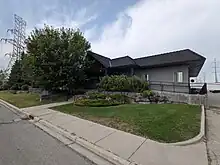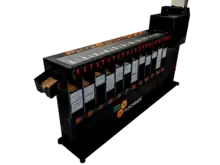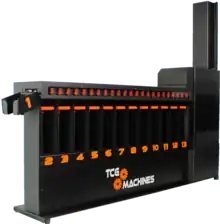TCG Machines Inc. is a Canadian multinational robotics company headquartered in Calgary, Alberta. TCG Machines designs and manufactures automated sorting machines for the trading card and trading card game (TCG) market. Their core product is the PhyzBatch-9000 (pronounced "fizz-batch", a portmanteau of "physical batch"), a machine capable of scanning, identifying, digitally cataloging, and physically separating Magic: The Gathering and Pokémon cards. The primary customer base for TCG Machines is game stores that buy and sell trading cards.[1] The company has announced that they are developing software which will enable the PhyzBatch-9000 to process sports cards by 2024.[2][3][4]
Incorporated on January 2, 2015, TCG Machines is led by CEO Graeme Gordon, P.Eng., CPO Daniel Kusler, P.Eng., and CTO Stephen Baker. TCG Machines first made the PhyzBatch-9000 available for order in May 2021, with machines initially being available for lease in Canada and the United States.[3] The first production model PhyzBatch-9000s were delivered to customers in June 2022.[5] The company has publicly declared their intention to make the PhyzBatch-9000 available in the European Union, Australia, and Japan.[6][7]
 | |
 Headquarters in Calgary, Canada | |
| Type | Privately held company |
|---|---|
| Industry | Robotics Automation Artificial intelligence |
| Founded | January 2, 2015 in Calgary, Alberta, Canada |
| Founder | Graeme Gordon |
| Headquarters | , Canada |
Area served | North America |
Key people |
|
| Products | PhyzBatch-9000 |
| Services | |
Number of employees |
|
| Website | tcgmachines.com |
History
Founding (2015-2016)
The company was incorporated federally on January 2, 2015 by Graeme Gordon. A player of the Magic: The Gathering card game, Gordon had completed a multi-day effort to sort through his personal card collection and realized there must be businesses which required card sorting services on a much larger scale.[7][8][9] In the summer of 2016, Gordon made phone calls to 200 comic and game stores across eight Canadian provinces and 30 American states.[2][6] Feedback from the phone survey was positive, with more than 90% of the stores contacted indicating they would be interested in acquiring an automated card sorter.[8]
A mechanical engineer, Gordon was employed in Alberta's oil and gas industry as a designer of automated drilling equipment.[3] In September 2016, Gordon left his oil and gas career and began working full-time to develop a trading card sorting robot.[5][6][8][9]
PhyzBatch-9000 - Alpha Prototype (2016-2020)

In 2016, Gordon applied for a $10,000 grant through Alberta Innovates to hire his roommate, an electrical engineer, to design and prototype the circuit-boards required to control the machine.[2] By 2018, Gordon had developed the first working machine, which he used to conduct product demonstrations for several game stores in Calgary.[10] Following a demonstration, Phoenix Comics NW agreed to test trial the new machine.[2][9][10] Between 2018 and 2020, Phoenix Comics processed one-million Magic: The Gathering cards using the alpha prototype PhyzBatch-9000.[9]
PhyzBatch-9000 - Beta Prototypes (2020-2021)

In 2020, TCG Machines received a $100,000 grant from Alberta Innovates to build eight more prototype robots.[2][3][9][10] These beta prototype machines were distributed to customers across Alberta to further vet the technology prior to a commercial release of the PhyzBatch-9000.[3]
PhyzBatch-9000 - Early Production (2021-2023)

On Star Wars Day, 2021, TCG Machines commercially launched the PhyzBatch-9000.[3] The company received 50 orders over the first 30 days following the launch.[3] The company ended 2021 with five employees on staff.[3][6]
The 2021–2023 global supply chain crisis brought on by the COVID-19 pandemic resulted in significant production delays, and the first production model PhyzBatch-9000s were not delivered until June 2022.[5][6] In August 2022, TCG machines was awarded $75,000 in funding from the National Research Council Canada (NRC)'s Industrial Research Assistance Program (IRAP) to help improve their production processes.[11] In December 2022, TCG Machines was awarded $75,000 in funding through NRC-IRAP to expand their development team and improve upon their existing suite of software.[12] The company ended 2022 with 20 employees on staff.[3][6]
In February 2023, TCG Machines deployed their 100th machine.[5][9] On July 2, 2023 TCG Machines' distributed fleet of PhyzBatch-9000s surpassed a collective total of 100-million trading cards processed.[4][10] By August 1, 2023 the company had over 150 machines deployed.[3][10]
Global Expansion and Sports Cards (2023-present)
TCG Machines has one PhyzBatch-9000 operating in Germany on a prototype basis, and has declared their intention to make the PhyzBatch-9000 available in the European Union.[6][9] The company has cited Australia and Japan as being other high priority markets.[6][7]
TCG Machines has stated that they are developing software which will enable the PhyzBatch-9000 to process sports cards by 2024.[2][3][4]
Technology
Conveyance
The PhyzBatch-9000 is a double-roller based system, similar to that of punched card sorters, differentiating it from other commercial card sorting machines which are based on a Cartesian coordinate robot system.[5][10] The PhyzBatch-9000 sorts and conveys cards at a rate of 60 cards per minute.[3][4][5]
Recognition
To identify specific cards, the PhyzBatch-9000 utilizes cameras and optical sensors in combination with proprietary computer vision techniques.[8] TCG Machines uses machine learning and artificial intelligence in their software.[3][4][5]
TCG Machines has patents pending for rapid card quality assessment and holographic optical element (i.e. foil card) detection.[5][6] The ability to differentiate between foil, or holofoil, cards and their regular counterparts allows the PhyzBatch-9000 to assign the appropriate value to cards based upon their foil, or non-foil, characteristic.[6]
The PhyzBatch-9000 is not able to detect counterfeit cards.[5]
References
- ↑ Mercer, David (2023-06-09). "What it takes to find the million-dollar trading card". CBC News. Retrieved 2023-09-22.
- 1 2 3 4 5 6 Poignant, Gary (2023-06-21). "A life-changing career move was in the cards--literally". Alberta Prime Times. Retrieved 2023-06-21.
- 1 2 3 4 5 6 7 8 9 10 11 12 13 Toy, Adam (2023-08-02). "Calgary company using AI to boost its trading card game sorters". Global News. Retrieved 2023-08-03.
- 1 2 3 4 5 Momney, Craig (2023-08-02). "Card sorting machine inventor using AI technology". Global News. Retrieved 2023-08-03.
- 1 2 3 4 5 6 7 8 9 Thomas, Knowlton (2023-06-12). "Calgary Startup Taps AI to Build Unique Sorting Machine for Collectible Cards". Calgary.tech. Retrieved 2023-06-13.
- 1 2 3 4 5 6 7 8 9 10 Blair, Nicole (2023-01-04). "Graeme Gordon: TCG Machines Providing Relief and Support to Local Game Stores by Supplying Them With Tools To Help Them Succeed - Made in CA". Made in CA. Retrieved 2023-05-21.
- 1 2 3 Henley, Ted (2023-06-05). "Calgary company builds machines that can sort trading cards automatically!". Global News. Retrieved 2023-06-09.
- 1 2 3 4 Gupta, Boshika (2023-06-09). "Collectibles for sale: How a card-sorting machine is revolutionizing trading cards". CBC News. Retrieved 2023-06-09.
- 1 2 3 4 5 6 7 Mercer, David (2023-06-09). "How a card-sorting machine is revolutionizing trading cards". CBC News. Retrieved 2023-06-23.
- 1 2 3 4 5 6 Patton, Julie (2023-08-01). "A Calgary man built a machine to sort trading cards. Now with 150 machines sold, he has sorted 100M cards". Calgary Citizen. Retrieved 2023-08-01.
- ↑ "Grants and Contributions: Development and Optimization of Production Processes". Government of Canada. Retrieved 2023-12-21.
- ↑ "Grants and Contributions: Software Infrastructure Development". Government of Canada. Retrieved 2023-12-21.